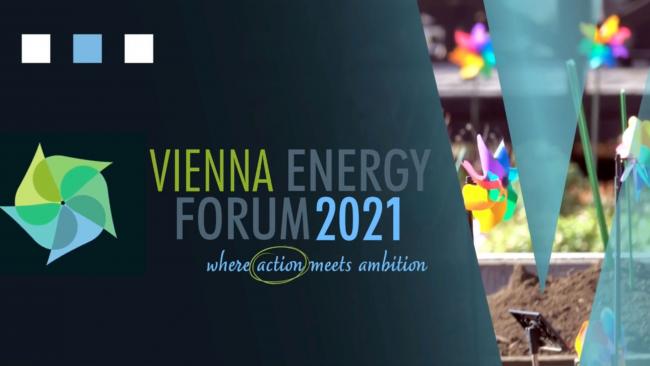The Vienna Energy Forum 2021 (VEF 2021) opened virtually today with welcoming remarks by representatives of the three VEF cosponsors, the UN Industrial Development Organization (UNIDO), the International Institute for Applied Systems Analysis (IIASA), and the Austrian government.
The first day focused on “accelerating action" with a view to supporting the High-level Dialogue on Energy (HLDE) to be convened under the auspices of the UN General Assembly on 20 September 2021, as well as during the 26th meeting of the Conference of Parties to the UN Framework Convention on Climate Change (UNFCCC) (COP 26) scheduled for November 2021 in Glasglow, Scotland, UK.
The opening plenary provided the big picture, with panels on the 2030 energy goals and COP 26. The rest of the day’s three High-Level Plenaries featured panel discussions on key recommendations and partnerships with regard to three key energy end-uses, namely: food systems transformation, industry integration, and energy-efficient products.
In his opening address UNIDO Director-General Li Yong announced the Global Partnership for Hydrogen Application in Industry. Later in the day a “Concrete Action for Climate” partnership was announced by the Mission Possible Partnership, the Global Cement and Concrete Association and the World Economic Forum, which will seek to make the cement and concrete industry carbon neutral by 2050, with a roadmap that includes 2030 goals.
Accelerating Action
The panel on 2030 energy goals discussed galvanizing action to promote energy transformation and the achievement of targets under the Paris Agreement and the Sustainable Development Goals (SDGs), particularly SDG 7 on access to affordable, reliable, sustainable, and modern energy for all. The panel emphasized the need for a people-centered approach where people's needs and the capabilities to address them are the focus.
Noting that current Nationally Determined Contributions and clean energy investment levels are not sufficient to meet the 1.5 degree global temperature rise goal, the panel on COP 26 discussed: scaling up funding and investments, addressing not just supply but also end uses and energy efficiency; moving from negotiations to action; and finding ways to “humanize energy” to galvanize public support for the scale of the transformation that is required.
Food Systems Transformation
A panel on “scaling up food productivity” examined the role of decentralized renewables in food systems by striking the right balance between affordability and creating a market pull, as well as promoting gender equality and the empowerment of women.
A panel on “smart food systems” discussed how affordable, decentralized access to renewable energy for small hold farmers, particularly in Africa and Asia, could significantly help address food insecurity and climate change and reduce rural-urban migration, particularly if projects address real local needs.
Industry Integration
The panel on “winning the ‘race to zero’” examined the significant role energy-intensive industries, such as cement, steel and aluminum, can play in creating positive multiplier effects towards achieving a climate-neutral economy by 2050 through shifting industrial production and feedstock to alternatives, such as green hydrogen and large-scale carbon capture, utilization and storage (CCUS), and hydrogen. Since the scale of this transformation could be disruptive to many industries, panelists agreed a systemic and sectoral approach is needed, setting technological roadmaps towards 2050 with important milestones to be reached by 2030. Panelists also highlighted the possible role of “green” government procurement in moving the market.
The “digital revolution” panel discussed how digitalization, accelerated as a result of the COVID-19 pandemic, and increasing use of artificial intelligence (AI), can serve to: track energy use; model and manage energy demand and distribution; increase efficiency; boost productivity; interconnect industries with their power producers and end-users; test and evaluate new technologies; and create markets for “green” industrial products from these industries by improving their accountability and certification.
Energy-efficient Products
The panel on “sustainability vs. profitability” discussed enabling factors for product innovation, including proven policy and regulatory interventions to encourage market development, such as minimum energy efficiency standards or minimum energy performance standards. Participants spoke about the climate and economic benefits of energy efficiency but noted bringing efficient products to market can be costly unless enabling policies are put in place, energy subsidies removed, and appropriate business models developed.
The “affordability matters” panel explored the importance of deploying innovative business models to create large-scale market pull and reduce barriers to entry for both entrepreneurs and end users. Panelists discussed different strategies to increase uptake of more efficient products even through they often involve: higher initial costs, such as utility rebates for efficient products; greater access to climate finance; creative financing schemes; bundling with off-grid systems; consumer labeling; increasing consumer awareness of lower operational costs over product life; and restrictions on imports of less efficient appliances.


















